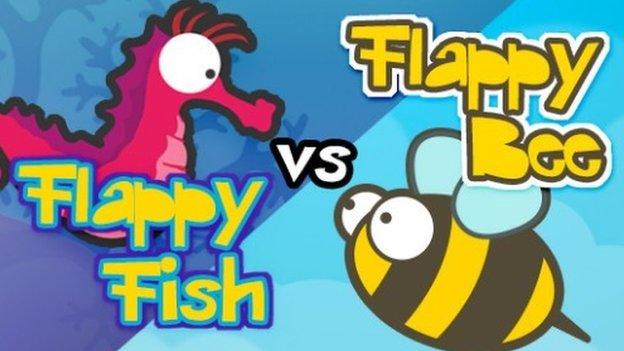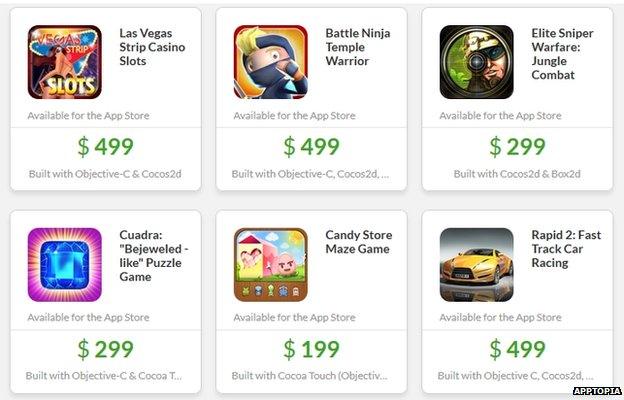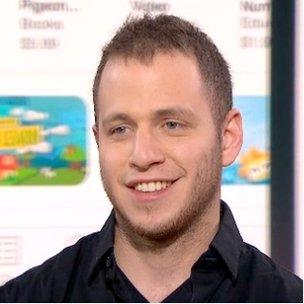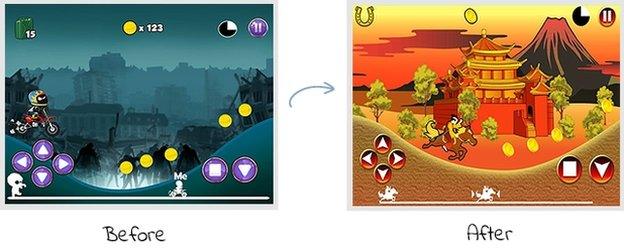Flap happy: How you too can become a mobile games mogul
- Published

Flappy Bird's success has spawned a plethora of similar games developers can create from templates
Flappy Bird, the mobile-phone game that was making as much as $50,000 (£30,000) a day for its developer before he pulled it from online stores, took one man just two or three days to write.
It shows that there's still a place in the £40bn video games industry for independent makers, or indies, working alone.
And it's easier than you may think to build your own game that could potentially become a global hit, thanks to a growing number of marketplaces for off-the-peg games templates.
It turns out you don't even have to know how to write a single line of code to make a living selling mobile games on sites like Apple's App Store or Google's Play Android store.
Code marketplaces, like Binpress, Apptopia, Chupamobile and CodeCanyon, are offering game templates for a few hundred pounds.
These templates provide the program code required for a basic game, which buyers then flesh out by adding their own graphics, music and overall theme to make an app which is ready to be sold.
'Swipe to slice'
These types of games are usually offered as free apps, generating money through advertising included in the game. Even the code to display the ads, which are provided by online advertising networks, is included in the game template, so the buyer needs only add an account number with each network to start earning money.
"What you are buying with a template is a simple game mechanic - something like pressing on the screen to shoot something, or swiping the screen to slice," says Jonathan Kay, one of the founders of US-based code marketplace Apptopia. "That forms the basis of your app."
Buyers of a "swipe to slice" template could then create a fruit-slicing game similar to the popular Fruit Ninja app, or something with a different theme, like slicing the heads off leaping zombies, he says.

You can buy off-the-peg game templates from online marketplaces like Apptopia
"If you have some design skills, then the only programming experience you need is knowing how to drop the graphics you create into the code."
"There are definitely still opportunities for independent developers in the mobile market because the barriers to entry are much lower," says Richard Wilson, chief executive of Tiga, the UK games industry association.
"People are not prevented from developing their own mobile games in the way that they are prevented from developing for games consoles," he adds.
'Tap to flap'
Games for Sony's PlayStation and Microsoft's Xbox consoles can cost tens of millions of pounds to make and involve teams of 300 or more developers.
Templates enable entrepreneurs to create "copycat apps" that cash in on the latest app trends. Currently there is a plethora of Flappy Bird-like templates with names like Flappy Penguin, Flappy Crocodile and Flappy Fish, all explicitly offering similar "tap to flap" mechanics.

You do not need programming experience to create a mobile game, says Apptopia's Jonathan Kay
Since so many games are similar, good graphic design can make all the difference between success and failure, Kay believes.
"There is definitely a correlation between good design and how long people use an app - 40% to 50% of apps get deleted within 45 seconds of being downloaded," he says. "But good design buys your app extra time when it can earn advertising revenue."
Another key to an app's success, Mr Kay believes, is the ease with which it can be found in online app stores.
"App store optimisation - choosing the right game title, keywords and so on - is incredibly important," he says.
Translating these keywords into other languages is also crucial, he adds.
"If someone in Korea feels like shooting some flying pigs and you have a shooting flying pigs app but haven't translated your keywords into Korean then they are simply not going to find it."
Game economics
There's a more fundamental reason why so many apps are derivatives of each other: the short shelf-life of most mobile games makes it hard to create original games profitably, according to Jaime Enriquez, founder of games company, Inode Entertainment.
"When I started I developed a bunch of games from scratch, and that cost me about $10,000 per game. But the economics just didn't work," he says.
"Now I buy a game template for $500, change the theme and maybe add a feature or two, and end up with a game that could generate $10,000."
As well as enabling Mr Enriquez to create games at a far lower cost, templates allow him to get them to market quickly, often in a matter of days - important when popular themes can change by the week.
And with Google and Apple app stores both taking 30% of revenues, high download volumes are essential if indie mobile developers are to make money.

A basic game template for mobile can be adapted to create a different feel
"If you understand the trends, that's probably 80% of what you need to succeed," he argues. "The other 20% is buying the right template."
So what's trending right now in the mobile app world?
Mr Enriquez says that apart from Flappy Bird clones, popular themes include winter sports, pixel art and cute-looking animal characters.
"If you bought the right template and produced a game with a cute, ski-ing flappy kitten with 1980s-style graphics, it would probably do rather well," he concludes.